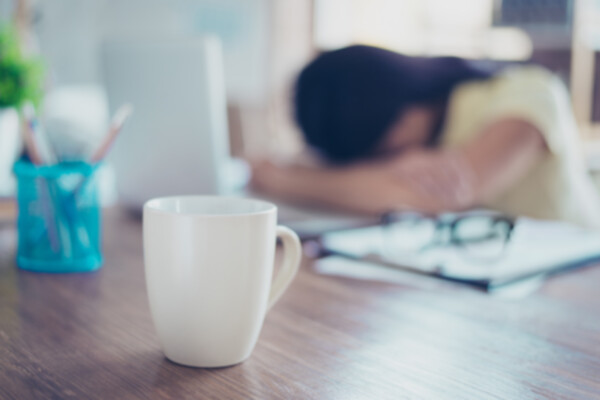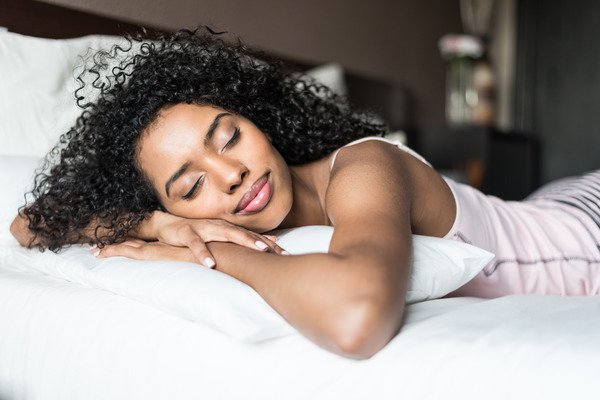Do you only want to sleep? Do you think you can’t get out of bed? You may be suffering from excessive sleep. Discover the main causes of just wanting to sleep and how to solve it.

“For a long time I just wanted to sleep. I don’t want to think or do anything…”. Many people can identify with this expression, with that state of inaction, in which everything weighs, everything overwhelms, and sleep is chosen as the only solution. Now, it is not always, since it can be used as an evasion or escape mechanism.
Get carried away by him desire to sleep and making it the center of daily life indicates that something is not right. This is a warning sign that we should not let go unnoticed, since it is normal to feel tired at times, just as rest is necessary, however when you just want to sleep what happens is something else. Let’s see it below.
I just want to sleep: main causes
Sleep It is inherent to the human being. We need sleep so that the body regulates itself and carries out certain functions, such as the secretion of growth hormone, energy recovery or the reorganization of information, among others. Therefore, sleep is a vital function, as well as neuroprotective.
The problem occurs when a decompensation is experienced, that is, when there is a recurrent lack of sleep or a excessive need to sleep In this case, we will focus on the latter.
Thus, according to research published in the journal Annals of Neuropsychology, excessive sleep, specifically sleeping more than 9 hours, affects quality of life. Which means that academic, professional and social activities are also affected. Now, what are the main causes of a person just wanting to sleep?
-
Sleep as an escape mechanism
Some people, when they have problems or difficulties, sleep to escape the suffering. Something like “sleep so as not to suffer”. It is a passive attitude in which the real problem is not confronted, so the discomfort remains over time.
It is also common in situations of mental saturation in which one can no longer take any more. Which is closely related to procrastination and anxiety. Be that as it may, the intention is sleep to avoid confrontation and take responsibility.
-
Accumulated stress
There are times overloaded with worries and pressures, whether work, family or social. The point is that if the pace is not slowed down, the person can end up blocked and even present some physical ailment as a result of stress.
Thus, when a person in this type of situation expresses that “I just want to sleep” What you want is to rest, disconnect from that frenetic pace and hyperactivity. Therefore, the best option is to give the body what it needs: a break to regain strength and energy.
-
Depression
Depression is related to sleep disorders, both those that involve a need to excessive sleep (hypersomnia) as well as those related to a lack of it (insomnia and others). In fact, it is often common for people who suffer from mood disorders to take refuge in their bed or sofa as an attempt to alleviate their suffering, although in the long term it means quite the opposite.
-
Disorders related to excessive sleep
In addition to all the above, sleep excessively It can also be a symptom of other disorders, as stated by the Spanish Sleep Society. Hence it is advisable to go to the doctor to report how we feel.
The disorders and difficulties related to excessive sleep are the following:
- Kleine-Levin syndrome: It is a rare neurological disorder and is more prevalent in men. It is characterized by profound episodes of hypersomnia, emotional instability, hyperphagia and hypersexuality.
- Narcolepsy: a disease of neurological origin that is characterized by a excessive daytime sleepiness and in some cases cataplexy.
- Hormonal alterations: Hormonal changes affect the quality of sleep. For example, regarding the great need for sleep, we can mention the functioning of thyroid hormones in hypothyroidism, which is related to episodes of fatigue, tiredness and excessive sleep
- Medical illnesses: Anemia, cardiovascular diseases, fibromyalgia, obesity or diabetes are some of the diseases related to sleep disturbances.
- Substance abuse: Drugs alter the functioning of the body in many ways. One of them is the impact on sleep patterns, causing in some cases episodes of great drowsiness.

What can I do if I just want to sleep?
The most advisable thing is to go to the doctor, since as we have seen the causes can be diverse: from a hormonal alteration to psychological problems. The fact is that having that feeling of “I just want to sleep” It is a warning sign that something is happening to us, which is why it is important to identify it and act, instead of letting it pass. He will give us some recommendations and if he considers it necessary, he will refer us to a specialist, such as a psychologist.
Of course, there are a series of habits and tips that can help us when we find ourselves in this situation or even when we notice that the sleep quality has gotten worse. They are the following:
1. Take a routine
Establish a routine and fixed schedules as much as possible. Leading an orderly life facilitates rest and recovery.
2. Have rest periods
From time to time we have to take breaks to relax and disconnect from what we are doing to connect with ourselves. If we do not rest, it is impossible to perform, but also to enjoy.
3. Exercise
Exercise helps us fight against a sedentary lifestyle and helps us feel better through the secretion of endorphins.
4. Practice meditation or perform relaxation exercises
Meditating, breathing or relaxing are a perfect way to calm and well-being. Thanks to this, we can turn off the noise in the mind, organize ideas and avoid worrying about what may not happen or that we cannot solve at that moment.

5. Do activities that you enjoy
There is nothing like spending time doing what we like. It may be difficult at first, but if we put it into practice little by little, it will be very satisfying in the long run. As psychotherapist Russ Hurris expresses, “Committed action comes first, feeling motivated comes later”.
6. Have a healthy diet
A balanced diet is also important to feel better and avoid excessive sleeping Hence, large dinners are not recommended.
7. Reflect on sleep patterns
How much do we sleep? More or less what average hours per day? how do we wake up? What feelings do we have? Checking our rest is essential, since we can try to make some changes and see how they affect us.
As we see, the expression of “I just want to sleep” It is related to a large number of aspects, among which the quality of our rest and the habits we have in our daily lives stand out. Let’s not forget that sleep helps us regulate ourselves, so it is essential to worry about it and go to the specialist when we feel the need for excessive sleep.








